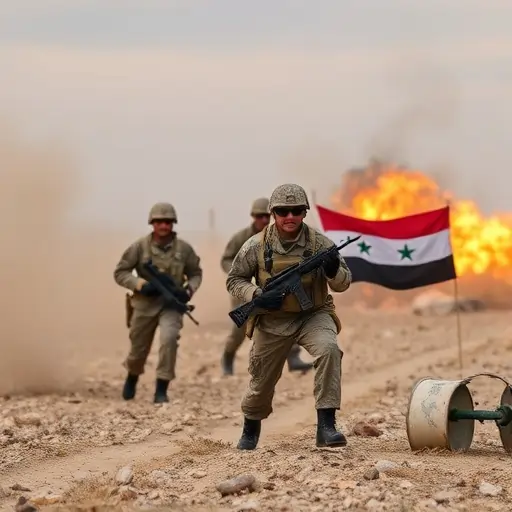Introduction: Why Syria Dominates Global Headlines
Syria has become a central focus of international news once again, with tensions escalating at a rapid pace. The complex dynamics involving the Syrian government, regional players, and global superpowers have created a volatile situation. The conflict has significant implications for the Middle East and the global geopolitical landscape. This article breaks down the current state of affairs, the key players involved, and the potential outcomes of this ever-evolving crisis.
The Current Situation: Syria’s Internal Struggles
In recent weeks, Syria’s internal conflict has intensified. The Syrian Army announced a strategic withdrawal from key territories, prompting military action from various factions. Aleppo, one of Syria’s largest and most historically significant cities, has become a focal point of this renewed conflict. Russian forces have launched an intense bombing campaign over Aleppo, aiming to maintain control over this strategic city.
Meanwhile, Turkey has taken an unexpected stance by supporting anti-Assad forces. This move has shocked many, particularly in the Islamic world, as Turkey was previously expected to oppose Israeli and U.S. influence in the region. Instead, Turkey now backs factions that challenge the Assad regime, further complicating the conflict.
Key Players in the Syrian Conflict
1. Syrian Government and Its Allies
The current Syrian government, led by President Bashar al-Assad, is backed by Russia and Iran. Both nations have vested interests in maintaining Assad’s rule. Russia has established multiple military bases in Syria, particularly in the Mediterranean region, while Iran supports Hezbollah’s activities in the country. Together, they aim to resist any external attempts to overthrow the Assad government.
2. Opposition Forces
Numerous factions oppose Assad’s regime, with many receiving backing from the U.S., Turkey, and Israel. These groups, often referred to collectively as the Syrian Interim Government or Free Syrian Army, seek to establish a pro-Western government. Their primary objective is to dismantle Assad’s power and remove Russian military influence from Syria.
3. Turkey’s Strategic Maneuvers
Turkey’s involvement in Syria has evolved significantly. Previously perceived as a potential adversary to Israel, Turkey is now actively supporting groups aligned with U.S. and Israeli interests. This alliance offers Turkey the opportunity to expand its influence in northern Syria, a region with historical and strategic importance. However, this move risks destabilizing relations with other Islamic countries and regional powers.
Geopolitical Ramifications
The Syrian conflict is not merely a civil war; it is a geopolitical chessboard involving global superpowers. The U.S. and its allies aim to weaken Russia’s foothold in the Middle East by toppling Assad. Conversely, Russia is determined to maintain its influence through military presence and strategic alliances.
The Role of the United States
Under President Joe Biden’s administration, U.S. policy focuses on supporting opposition forces to force Assad out of power by January 2025. This strategy contrasts sharply with former President Donald Trump’s approach, which emphasized minimal involvement in Syria. Trump famously referred to Syria as “sand and death,” indicating a lack of interest in prolonged engagement. Biden’s policy shift, however, signals a renewed commitment to influencing the region’s future.
Israel’s Position
Israel’s role in the conflict is multifaceted. While historically opposed to Assad’s regime, Israel has found common ground with Turkey in supporting opposition forces. This alliance serves Israel’s broader objective of weakening Iran’s influence in Syria and reducing Hezbollah’s presence.
The Importance of Aleppo
Aleppo holds immense strategic and symbolic significance. As a historic trade hub and cultural center, controlling Aleppo means controlling a vital part of Syria’s economic and logistical framework. Russian forces are determined to retain control over the city to prevent it from falling into the hands of opposition forces backed by the U.S., Turkey, and Israel. Losing Aleppo would be a severe blow to Assad’s regime and Russia’s influence in the region.
The Road Ahead: Potential Outcomes
The situation in Syria remains fluid, with multiple possible outcomes:
- Continued Escalation: If military actions intensify, the conflict could escalate into a broader regional war, involving neighboring countries and global powers.
- Regime Change: Should the opposition forces succeed, Assad’s removal could lead to a fragmented Syria, with different factions controlling various regions. This outcome would likely benefit Western and Turkish interests but could also create long-term instability.
- Diplomatic Resolution: Although unlikely in the current climate, a negotiated settlement involving all key players could stabilize the region. However, this would require significant compromises from all sides.
Conclusion: A Crisis with Global Implications
The Syrian conflict is far from a localized issue; it is a crisis with far-reaching implications for global politics. As the power struggle continues, the world watches with bated breath, knowing that the outcome will reshape the Middle East’s future and potentially alter international alliances. The coming weeks and months will be critical in determining Syria’s fate and the geopolitical balance in the region.

